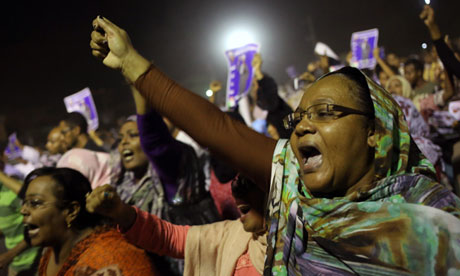By: Dan Krupinsky
Impunity Watch Reporter, Africa
KHARTOUM, Sudan – Protests against Sudanese President Omar al-Bashir, representing the largest protests in the capital in years, are one of the most serious challenges yet to the president’s authority during his 24-years in office.

In the latest wave of protests that have persisted for over a week, national security forces fired tear gas in an attempt to break up a demonstration held inside a women’s university in the capital on Monday.
The Associated Press is reporting that two students, speaking only on the condition of anonymity out of fear of retribution, told them in a phone call that hundreds of students were clapping and chanting in opposition of al-Bashir, until the building was inundated with tear gas.
“I saw students falling, fainting from the heavy gas. Ambulances rushed to the university,” said one of the students.
Protests, many of them deadly, have taken over several Sudanese cities since last Sunday, when the government lifted subsidies on gasoline, which resulted in a price increase that was almost doubled the price, and is expected to have a similar effect on other goods.
According to international rights groups, at least 50 protesters have been killed by government forces. Doctors and activists put the death toll higher, claiming that over 100 people have died so far. The government has acknowledged 33 deaths, including police officers.
“The protests will continue and will reach a general strike. This is our aim,” said Ghazi al-Sanhouri, a nephew of the dead protester, to The Guardian. “We will keep uncovering the regime’s brutal tactics in suppressing the protests by killings and atrocities.”
Additionally, journalists say that a media blackout has been imposed on them by the government, banning them from covering the actions.
“The government feels that its own existence is endangered and the press is playing a role in influencing public opinion…they want papers to turn into official gazettes that reflect only [the government’s] point of view with no criticism or negative feedback,” said Diaa Eddin Belal, editor-in-chief of al-Sudani newspaper, to The Guardian.
The government said on Sunday that it would give out payments to families in need, raise the minimum wage and boost public sector salaries, in an effort to please the frustrated and increasingly violent and irritable public.
Schools have been closed since for almost a week after high school students led protests against al-Bashir in different parts of the capital, and are expected to stay closed until late in October.
For further information, please see:
ABC News – Sudan Security Fires Gas at University Protest – 3o September 2013
Al-Jazeera – Sudan defends crackdown amid more protests – 1 October 2013
The Guardian – Sudan protesters call for president Omar al-Bashir to step down – 30 September 2013
New York Times – Sudan Erupts in Deadly Protests as Gas Prices Rise – 26 September 2013